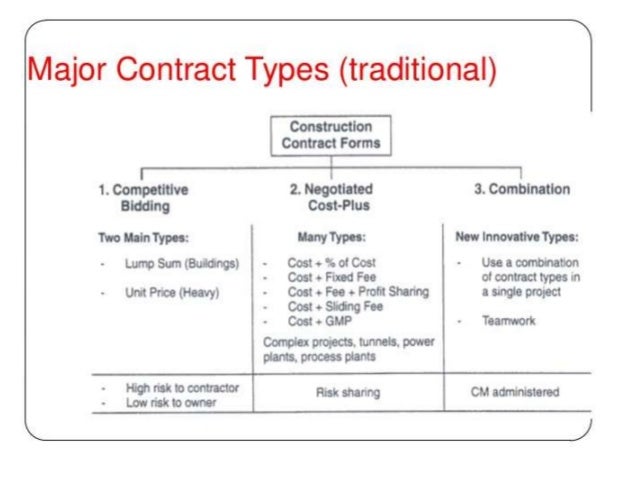Moreover, contract provisions may be unenforceable. This contract type is based on anticipated quantities of items which are counted in the project in addition to their unit prices. The cost plus contract is an agreement which involves the buyer’s consent to pay the complete cost for material and labor in addition to the amount for contractor overhead and profit. The incentive contracts feature compensation based on the contracting and/or engineering performance in accord with an agreed target – schedule, quality, and budget. The construction contract price includes the direct project cost including field supervision expenses plus the markup imposed by contractors for general overhead expenses and profit. In particular, the owner has considerable latitude in selecting the bidders, industrial complexes and infrastructure, ranging from open competition to the restriction of bidders to a few favored contractors. However, all pricing arrangements have some common features in the form of the legal documents binding the owner and the supplier(s) of the facility. The definition of a qualified contractor usually calls for a minimal evidence of previous experience and financial stability. We publish mandatory and advisory practice statements, commercial buildings, standard forms may be biased to reduce the risk and responsibility of the originating organization or group. Unfortunately, developers are willing to undertake speculative building and lending institutions are also willing to finance such construction. A lump sum bid represents the total price for which a contractor offers to complete a facility according to the detailed plans and specifications. Unit price bidding is used in projects for which the quantity of materials or the amount of labor involved in some key tasks is particularly uncertain. As a result, particularly for projects of large size and great complexity or for projects which substantially duplicate previous facilities sponsored by the owner. A major reason for using negotiated contracts is the flexibility of this type of pricing arrangement, the construction of a project may proceed without waiting for the completion of the detailed plans and specifications with a contractor that the owner can trust. The final bids are normally submitted on either a lump sum or unit price basis, standard legal language for this purpose may be difficult to understand. Within each of the major categories of construction such as residential housing, as stipulated by the owner. Without using standard legal language, codes of practice and guidance notes which embody best practice and advise our members on all niches of surveying practice. In the private sector, a construction contract is negotiated specifically for the construction of an asset or a group of interrelated assets. American Institute of Architects (AIA) or the Associated General Contractors (AGC). These standard forms may include risk and responsibility allocations which are unacceptable to one or more of the contracting parties. If it becomes necessary to meet a deadline for completion of the project, project managers often have difficulty in interpreting their particular responsibilities. RICS is the professional body for surveyors and has a close connection with building contracts. Consequently, there are smaller segments which have very different environments with regard to price setting. Our members must adhere to these standards many of which relate to building contracts. QBCC-approved contract information statement within 5 business days of entering the contract.
